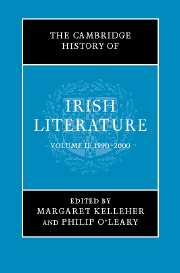Book contents
- Frontmatter
- Introduction
- 1 Literature and politics
- 2 The Irish Renaissance, 1890–1940: poetry in English
- 3 The Irish Renaissance, 1890–1940: prose in English
- 4 The Irish Renaissance, 1890–1940: drama in English
- 5 The Irish Renaissance, 1880–1940: literature in Irish
- 6 Contemporary prose and drama in Irish 1940–2000
- 7 Contemporary poetry in Irish: 1940–2000
- 8 Contemporary poetry in English: 1940–2000
- 9 Contemporary prose in English: 1940–2000
- 10 Contemporary drama in English: 1940–2000
- 11 Cinema and Irish literature
- 12 Literary historiography, 1890–2000
- Afterword: Irish-language literature in the new millennium
- Afterword: Irish literature in English in the new millennium
- Guide to major subject areas
- Index
- References
1 - Literature and politics
Published online by Cambridge University Press: 28 March 2008
- Frontmatter
- Introduction
- 1 Literature and politics
- 2 The Irish Renaissance, 1890–1940: poetry in English
- 3 The Irish Renaissance, 1890–1940: prose in English
- 4 The Irish Renaissance, 1890–1940: drama in English
- 5 The Irish Renaissance, 1880–1940: literature in Irish
- 6 Contemporary prose and drama in Irish 1940–2000
- 7 Contemporary poetry in Irish: 1940–2000
- 8 Contemporary poetry in English: 1940–2000
- 9 Contemporary prose in English: 1940–2000
- 10 Contemporary drama in English: 1940–2000
- 11 Cinema and Irish literature
- 12 Literary historiography, 1890–2000
- Afterword: Irish-language literature in the new millennium
- Afterword: Irish literature in English in the new millennium
- Guide to major subject areas
- Index
- References
Summary
The artist and the social world
When Seamus Heaney was awarded the Nobel Prize for Literature in 1995, that story received front-page treatment in the Irish broadsheet press and on news programmes of the electronic media. This was but one indication that creative writers are central to the self-image of Ireland. Another might have been found on the national banknotes still circulating in that year. These featured such figures as W. B. Yeats, James Joyce, Douglas Hyde and Jonathan Swift, as well as the nineteenth-century political leaders Daniel O’Connell and Charles Stewart Parnell. The number of artists far exceeded the number of political figures, such as were to be found on the currencies of most other European countries. In the modern Republic of Ireland, culture is often seen as healing, whereas history is viewed as divisive. If the last national currency before the arrival of the Euro in 2002 projected writers as part of the self-description of a people, the design of the very first set of coins for the Free State back in the 1920s had been entrusted to a committee chaired by W. B. Yeats. That same author was, even then, putting the final touches to A Vision, his attempt to write a personal imaginative system which might also function as a Celtic constitution for the emerging nation. Nor was there anything immodest about the ease with which Yeats identified his intellectual project with that of the nation. After all, by then James Joyce had presented his first collection of stories, Dubliners, as ‘a chapter of the moral history of my country’ and had ended A Portrait of the Artist as a Young Man with the protagonist’s promise to forge in the smithy of his soul ‘the uncreated conscience of my race’.
- Type
- Chapter
- Information
- The Cambridge History of Irish Literature , pp. 9 - 49Publisher: Cambridge University PressPrint publication year: 2006
References
- 2
- Cited by



